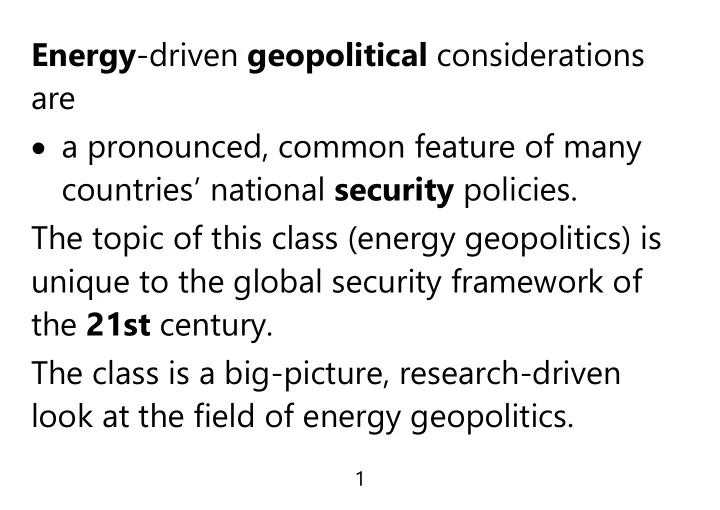

Energy -driven geopolitical considerations are a pronounced, common feature of many countries’ national security policies. The topic of this class (energy geopolitics) is unique to the global security framework of the 21st century. The class is a big-picture, research-driven look at the field of energy geopolitics. 1
1950s: US President Eisenhower’s “atoms for peace” program; above ground nuclear testing; proliferation of nuclear weapons 2
3
1960s: nuclear test-ban treaty & nuclear non- proliferation treaty 1970s: Western industrialized world awakened to oil vulnerability [energy insecurity] by Arab oil embargo ; environmental issues (acid rain) 4
5
1980s: collapse of Soviet Union and its control over Central and Eastern Europe; cessation of favorable Soviet energy pricing to Warsaw Pact allies (in return for political subservience) 1990s: emergence of the European Union , US Clean Air Act (mainly to curtail acid rain) 6
2000s: energy hostilities between Ukraine and the Russian Federation (over price mechanisms and strategic concessions) 2010s: European Union ’ s geopolitical battle over Russian gas dependence; support of construction of new infrastructure to diversify markets and reverse gas flows; Energy Union; Arab Spring (as OPEC producers feared losing control over own civil societies). 7
8
So, Geopolitics of Energy examines the intersection between international security politics energy . 9
Geopolitics of Energy implies a twin recognition energy has long been a major determinant of power in the international system shifts in global energy patterns bring with them changes in international politics. 10
We explore how countries shape their grand strategies to meet their energy needs such actions have implications for other countries and global politics . 11
Pressing contemporary issues relate to peak oil o il’s leverage derived from virtual monopoly as transportation fuel political reform and energy pipeline politics aggressive pursuit of oil and gas worldwide. 12
The example of Iran : derives influence by its threat to shut-down the Persian Gulf transit spigot (through which 20% of the world’s oil pas ses daily) funds its nuclear ambitions with Chinese and Indian dollars this is how it builds its geopolitical influence. 13
14
The example of the Arctic : historically apolitical region, resource reserves now politicize the polar tundra Arctic resources traditionally handled by littoral states China wants to get into the act by building infrastructure to allow navigation in a region where it has no sovereign presence. 15
“China is an important stakeholder in Arctic affairs. Geographically, China is a ‘Near -Arctic State’, one of the continental States that are closest to the Arctic Circle … The natural conditions of the Arctic and their changes have a direct impact on China’s climate system and ecological environment, and, in turn, on its economic interests in agriculture, forestry, fishery, marine industry and other sectors.” 16
17
We could also look at new technologies and innovations such as those making the extraction of shale gas economical assisting in the growth of renewables such as solar power how they are changing patterns of trade and could shape new alliances . 18
The unconventional oil/gas findings in the US : have enhanced its energy security have provided Europe with access to LNG as an alternative to Russian gas show how a technologically driven revolution may have global geopolitical implications. 19
20
Finally, Geopolitics of Energy considers the consequences of a successful shift away from petroleum based economies anticipates how a new energy order will alter global politics in fundamental ways. 21
Geopolitical twist on Carl von Clausewitz ’ s quote: energy is the continuation of politics by other means (especially in the energy- politics nexus of this first part of the 21st century). 22
Platias big-picture guy grand strategy qualitative approach Paravantis details guy specific research topics quantitative approach 23
Sources 1. Professor Meghan O'Sullivan, IGA-412: The Geopolitics of Energy, Harvard, https://www.hks.harvard.edu/degrees/teaching- courses/course-listing/iga-412 2. From the Editor, Energy Geopolitics in the 21st Century, April 19, 2012, http://www.ensec.org/index.php?option=com_conten t&view=article&id=350:energy-geopolitics-in-the- 21st-century&catid=122:fromtheditor&Itemid=389 24
Recommend
More recommend